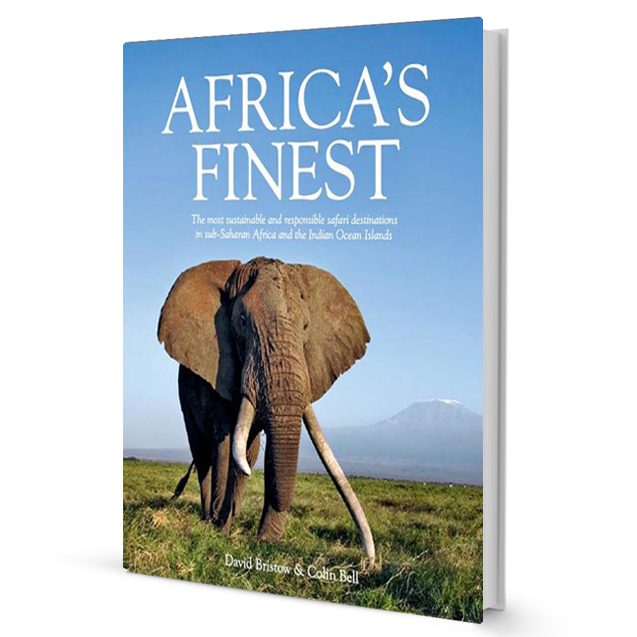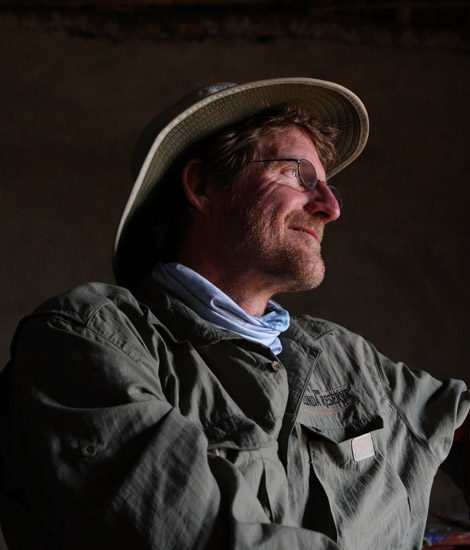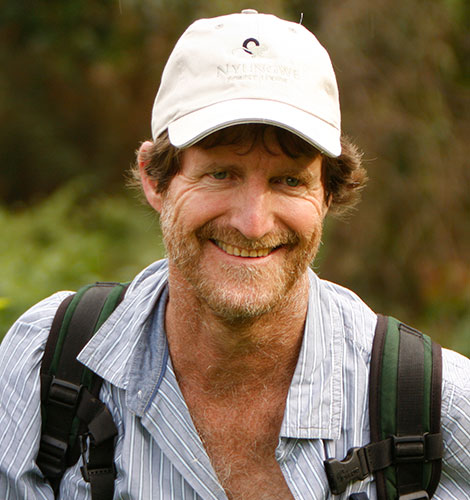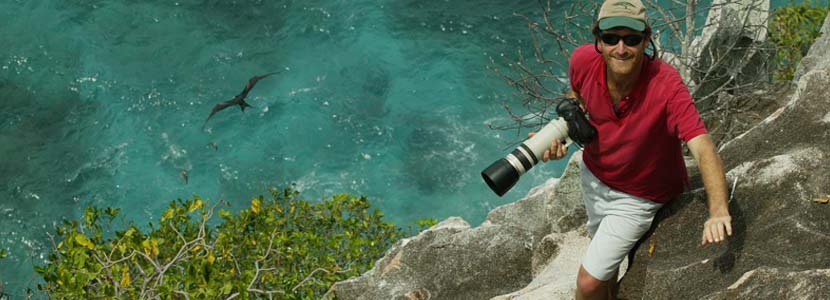Colin Bell
Founder and conservation legend of Wilderness Safaris
Colin Bell
My generation has had the most extraordinary experiences and interactions with wildlife and pristine environments that has enriched our lives and helped shape us as caring, nurturing human beings. Colin Bell.
Colin Bell is a passionate, inspirational and ground-breaking wildlife conservationist. He is one of the early initiators and practitioners of the ‘Green Safari’ model, creating sustainable tourism in his native Africa in partnership with rural communities.
Colin has a drive to preserve that which has gone before him, working in and amongst the Okavango Delta which he describes as ‘the Africa we all dream of’.For over 30 years Colin has worked across the majestic savannah of the Okavango Delta, surrounded by the vast ecosystem of wildlife, flora and fauna as the flow of water meets the scorching plains of the Kalahari Desert. The clash of water with desert brings a surrounding oasis of life that has to be seen to be believed.
Colin defines the unassuming, cause-driven adventurer who has carved green trails through the beauty at the heart of Africa with a focused mission to protect and preserve. He is powered by the knowledge that once gone, we cannot recreate what we have lost. He pioneers the necessity of working in partnership with the local communities that live amongst the wilderness and fights for the rural communities to be stakeholders in the boardrooms of both the tourism and wildlife industries. Colin’s belief that wildlife enriches our lives and makes us caring, nurturing human beings drives his need to offer the next generation the same pristine environments we have enjoyed. (Courtesy: BlackTomato.com)You could say Colin made his own luck – instead of going into the expected world of finance after completing his economics degree at the University of the Witwatersrand in 1977, he decided his first job would be as a safari guide in Botswana. In those days a cold beer came out of a wet long sock, tied to the side mirror of his Land Rover and cooled while hanging in the breeze. That was as good it as got. In 1983 Colin co-founded Wilderness Safaris with one of the best guides in southern Africa, Chris McIntyre. The two of them ploughed all their enthusiasm, energies and limited savings (and one second-hand Land Rover) into creating what became one of the most successful specialist safari companies in Africa.
Over the decades it grew to manage camps and lodges across 7 countries and employed more than 2,500 people. Many of these lodges gained their “bush cred” through partnerships with local communities: it was through those negotiations and relationships that Colin started to learn – by trial and error – what worked sustainably and what did not. Back then there were no blue-prints to follow or copy – creating safari partnerships with communities was breaking new ground. He sold his shares in Wilderness in 2005 and went on to co-found Great Plains Conservation a year later (and later moved on to found Natural Selection). Colin is now completely independent and this freedom has allowed him to immerse himself in the Africa’s Finest project without any vested interests. The lessons learnt, the battle scars and campaign medals earned, from the many models tried and developed over the decades helped to lay the foundations and principals for responsible, sustainable tourism – what we have termed the Green Safari model. This, we believe, is the one of the fairest ways to partner with local communities and Governments in order to create viable, long-term partnerships that are a winning scenario for wildlife, wildernesses and people.Courtesy: Author Profile - Africa's Finest 2014
Go back to: Leaders in tourism and conservation
The Wilderness Way – a brief history
Wilderness Safaris had its formal beginnings in Botswana in 1983. Two experienced overland safari guides, Colin Bell (a South African) and Chris McIntyre (a New Zealander), had been working in the remote, wilderness reaches of the country since 1977 and by the early 1980s had decided to strike out on their own. Their reasons for taking this plunge were as follows:
1) They wanted somehow to ensure that the financial benefits of their safaris flowed to Botswana and its people and ensured the sustainable protection of the country’s wildlife areas. 2) They wanted to offer authentic safaris with integrity that catered for people as passionate about nature as they were. At the time most professional safari outfitters in the photographic side of the industry were not based in Maun, did not pay tax in Botswana, employed mostly ex-patriots and sourced their supplies in neighbouring South Africa. Bell and McIntyre wanted to change this and accordingly registered a Botswana company and based themselves in Maun, south of the Okavango Delta. In retrospect this approach was logical and today forms the cornerstone and central tenet of ecotourism the world over, but in the early 1980s it was a ground-breaking philosophy that set Wilderness Safaris apart. What also set this young company apart was their pursuit of the specialist market. Bell and McIntyre were themselves competent naturalists, but over the years they had worked closely with the region’s pre-eminent ornithologists and popular bird book authors. As a result they actively pursued the bird watcher market and offered specialist safaris to the Okavango Delta and surrounding wildlife areas of northern Botswana in search of the special bird species of the region: Pel’s fishing Owl, Wattled Crane, African Skimmer and others. It was out of this focus that the company’s logo was born. The African Skimmer is the only representative of its family in Africa and its feeding (they skim the surface of large rivers using their unusual bills to catch small fish) and breeding biology (they nest on seasonally exposed sandbanks) requires the existence of pristine ecosystems; places where natural flood cycles are not interrupted by manmade dams, and waters sullied by erosion or pollution. These were the areas that Wilderness Safaris were interested in operating in, and where proceeds from safaris could be channelled towards funding the conservation of these habitats, and so the logo was designed around this species. In the beginnings of the company’s history, only mobile safaris were offered and only in Botswana. By 1985, Bell and McIntyre and new partners like Russel Friedman (a well-known natural history book dealer from Johannesburg) had decided to branch out into establishing tented camps on exclusive sites in these wildlife areas where they could base their overland trips and in between these trips also support fully-independent travellers with custom, tailor made itineraries. As a result, the lodge operating side of the business was born and in 1985 the first two permanent tented camps were developed, Xigera in the heart of the Okavango Delta and Xaro in the Okavango Panhandle. Jedibe in the permanent swamp area of the northern Delta followed in 1987 and in 1990 the company was offered Mombo, a little known camp on the then boundary of the Moremi Game Reserve on the northern tip of Chief’s Island. It was in an area that had been heavily hunted, but the potential was there and within a few years of photo-safaris having replaced hunting, Mombo rapidly developed an enviable international reputation. This was achieved mostly through a phenomenal wilderness landscape with many remarkable experiences, including exceptional wild dog viewing, but also very good viewing of other large predator species in a spectacular setting into which plains game streamed once it was clear that hunting was no longer practiced there. Over and above word of mouth endorsement, international media, such as National Geographic, really started to publicise the Botswana experience, as well as the Mombo brand and the camp became known as one of the finest wildlife viewing locations on the African continent! Wilderness Safaris’ custodianship of Mombo, including overseeing its incorporation into the expanded Moremi Game Reserve in the early 1990s and reintroducing black and white rhino into the wild ten years later, confirmed that our principles, values, ethics and business model could make a substantial contribution to sustainable socio-economic development for the future of Africa’s wild places. This coincided with growth in the Botswana business of Wilderness Safaris reaching a point where some individuals working within the company were ready to explore new regions. This was something that had been suggested many times by repeat guests of the company and it was logical that Wilderness Safaris begin to broaden its footprint. Dennis Rundle established an overland safari business in Namibia with the first lodge opening in 1993. Patrick Boddam-Whetham opened the first South African lodge in 1993 and Chris Badger and Andy Eggington used the same model to expand into Malawi in 1994. Brian and Lindi Worsley followed suit in Zimbabwe in 1995 and Zambia came on board in 2000. In 2003 we opened North Island in Seychelles and 2012 will see formal operations begin in Kenya and Congo (Brazzaville). Over time our reputation and operating experience enabled us to successfully tender for prime leases in key areas in all nine of the countries in which the company operates allowing us to today offer an unrivalled suite of camps and concessions in southern Africa, and, in turn, contribute materially to their on-going conservation. Courtesy: Wildernessblogger - May 2011SEE ALSO:
40 years of ecotourism- a journey of conservation - 2023
Wilderness, a 40-year journey in the making - November 2023 (video)
THE NATURAL SELECTION STORY
Natural Selection may be a new company, but our roots in the African safari business run deep. Our founders, Dave, Colin, Jen and James, are old friends who began their careers as guides in the bush many moons ago. Between them, they’ve amassed over a century of combined experience, and are true pioneers of photographic safaris in Southern Africa. And all of them are devoted to the simple premise that safari tourism, when done correctly, is an incredibly powerful tool for conserving and protecting Africa’s last great wild places.
In recent history, we’ve seen conservation of the natural world grow from a fledgling awareness in the 1960s, to a global interest. But somewhere along the way, Africa’s wild places became second best. Animals were poached, and wilderness areas were stripped of trees, eroded and mined. We realised that something had to be done to protect these areas, and help them survive, and that’s exactly what we’ve set out to do. After all, we want future generations to enjoy these wild places just as we are enjoying them now. We believe that by simply visiting a wildlife area, travellers are encouraging its continued protection through tourism revenue. For that reason, our deep commitment to conservation is matched only by our devotion to providing our guests, with the most unique and extraordinary safari experiences out there.What sets Natural Selection apart from other safari companies?
Natural Selection was created as a conservation-driven tourism company. From its inception, the business model of Natural Selection has been about creating an excellent safari experience that gives back. In fact, its original model was a non-profit that derived all funds through tourism market representation. We soon realized that we’d make a much bigger impact if we became a commercial safari company. This also gives us the opportunity to introduce visitors to the amazing conservation efforts as well as issues across southern Africa. Natural Selection brings visitors closer to Africa – a feet on the ground connection. To us the most important part of a safari is finding that connection to the bush by keeping things simple and enriching. When we step out of our routines, typical day to day concerns fade into the background, magnificent environments humble us and values shift, even if just slightly. Natural Selection is committed to making sure guests have fun. Conservation, connecting to Africa are all part of Natural Selection, but overall our guests need to have fun! It’s a holiday afterall. Natural Selection puts conservation before profit.Our Conservation Commitment:
At Natural Selection, conservation is at the heart of everything we do. The loss of any natural habitat, in Africa or other, is a sobering loss for us all, and we want to do something about it. We want to make a difference. To start with, we ensure that 1.5% of your stay in our lodges goes to wildlife conservation. The donations are built into our business model and based on your stay with us. We are wholeheartedly embracing our commitment to Africa's wildlife. In addition to this, we partner with the local communities, governments and conservation organisations in the areas where we operate to help protect (and sometimes even expand) these important conservation areas, and to create long-term benefits. We build camps that best suit the area, working with the environments and habitats that we find there. Camps and lodges shouldn’t be obvious; they should blend perfectly into their surroundings. Lastly, we intend to keep our guests abreast of Africa’s triumphs, losses and continued challenges, with the hope that we will inspire other wildlife-lovers to make a change. While it’s perhaps only a drop in the bucket of what is required, it’s a drop that we hope will make a difference. Natural Selection creates conservation partnerships. Natural Selection looks for partnerships that help us contribute towards conservation. This may be towards the expansion of wildlife areas, or a conversion to wildlife-friendly land use, or the upliftment of communities who live alongside wildlife and are committed to wildlife conservation. Each camp in the Natural Selection portfolio is unique in style and experience. As the contribution towards conservation is unique in each area of operation, so is the style and offering of each lodge. No two lodges in our portfolio are alike, because each is run by a different partner, providing individual input into the experience. Natural Selection is committed to minimizing its footprint. Our newly built camps use local materials, recycled materials and renewable energy. As much as possible, we want each camp to support local environmentally-friendly enterprise, to blend into the environment and to carefully manage and minimize waste. Courtesy: Natural Selection website 2020PUBLICATIONS
Colin Bell is co-author of Africa's Finest - a coffee table book that celebrates the lodges and camps in Africa that are making a difference: those practising environmentally friendly and sustainable tourism methods whilst providing world class safari and nature experiences. ..he has also co-authored The Last Elephants with Don Pinnock, a compilation by 40 contributors with outstanding photographs of African elephants and their landscapes. It provides a fascinating insight into elephants and conservation in some little-documented African countries, such as Gabon, Democratic Republic of Congo, Congo Brazzaville, Central African Republic, Republic of Togo, Chad and Mali and includes many success stories from private/public partnerships in the conservation of the African Elephant.
ARTICLES OF INTEREST
INSPIRING INNOVATION: COLIN BELL - JANUARY 2016
The Rhino Poaching Crisis: Colin Bell talks Statistics and Solutions by Cameron Duncan - March 2014
Go back to: Leaders in tourism and conservation




.jpg)